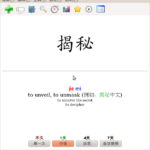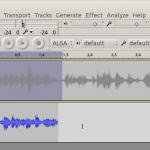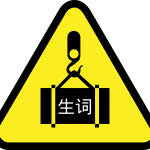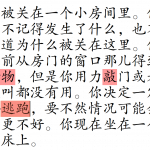 In a recent article, I talked about the pros and cons of taking a course that’s too difficult for you. We saw that if you have the time, motivation and support necessary, doing so can be great for learning, even though there are also potential downsides.
In a recent article, I talked about the pros and cons of taking a course that’s too difficult for you. We saw that if you have the time, motivation and support necessary, doing so can be great for learning, even though there are also potential downsides.
In this article, we’re going to look at how to survive and even thrive in a difficult learning environment in more practical terms. This is relevant regardless if you sought the challenge deliberately or if you were forced into it by circumstance. If you didn’t seek out the challenge, you still need to make sure you have time, motivation and support, otherwise you’re better off trying to get out of the water rather than trying to learn to swim.
Tune in to the Hacking Chinese Podcast to listen to the related episode:
Available on Apple Podcasts, Google Podcast, Overcast, Spotify and many other platforms!
We’re going to look at four things that can help you survive, and maybe even thrive, in a challenging learning environment. Most of these things are advisable even in easier courses as well, but become absolutely necessary when difficulty increases. Exactly how diligently you should follow this thus depends on how hard the course is!
Here’s how you can survive a language course that’s too hard for you:
- Previewing before lessons
- Staying focused and positive during lessons
- Reviewing and consolidating after lessons
- Coping with assignments and exams
Previewing before lessons
It’s hard to overstate the importance of previewing properly when the course material is beyond your comfort zone. Your classmates are ahead of you and the course is designed for people whose Chinese is better than yours, so if you don’t preview, you won’t benefit much from going to class.
While a few hours of previewing for a lesson won’t enable you to catch up with your classmates in general terms, you can close the gap locally for the specific content in question. Teachers will typically ask students to preview texts, but in most situations, students don’t do this properly, if at all.
This is your chance to put yourself on a more equal footing by going through the content in advance. Make sure you know what each lesson will cover, so ask the teacher for this information if it’s not clearly listed on the timetable. It’s important that you start previewing ahead of time, preferably a few days before the lesson so that you have a chance to absorb new vocabulary.
Here are a few previewing tasks that I recommend. I don’t mean that you should pick and choose, but that you should do all of them, which will likely take hours. Naturally, exactly how much time you spend depends on how hard the course is, but three hours per lesson is not unreasonable:
 Read the text at least once with overall understanding in mind – Normally, I recommend listening first, but reading is often easier considering that you can take your time and look things up, and there’ll be lots of things you don’t understand! Take this opportunity to look up words you don’t know and make sure you understand them in context. Make plenty of notes in the text itself so you have it available during the lesson later. After reading the text, you will have a general idea of what and how much you need to learn.
Read the text at least once with overall understanding in mind – Normally, I recommend listening first, but reading is often easier considering that you can take your time and look things up, and there’ll be lots of things you don’t understand! Take this opportunity to look up words you don’t know and make sure you understand them in context. Make plenty of notes in the text itself so you have it available during the lesson later. After reading the text, you will have a general idea of what and how much you need to learn. Learn the basic meaning of characters and words – When reading the text, overall understanding is the goal, so learning the meaning of the vocabulary as it’s used in the text is enough. You can use the word list, but note that there will be many characters and words that you don’t know. The key point here is that the words that are not listed in the textbook are more important to learn that those that are, because the authors assume that students on your level already know them. If you don’t, you should definitely learn them! I strongly suggest that you use spaced repetition software to keep track of, learn and review vocabulary. I also suggest you skip or skimp on handwriting as much as possible, as this will otherwise take up most of your time. If the teacher normally requires handwriting, see if you can negotiate your way out of it or maybe reach a compromise where you learn some characters but not all, or maybe you can type your exams.
Learn the basic meaning of characters and words – When reading the text, overall understanding is the goal, so learning the meaning of the vocabulary as it’s used in the text is enough. You can use the word list, but note that there will be many characters and words that you don’t know. The key point here is that the words that are not listed in the textbook are more important to learn that those that are, because the authors assume that students on your level already know them. If you don’t, you should definitely learn them! I strongly suggest that you use spaced repetition software to keep track of, learn and review vocabulary. I also suggest you skip or skimp on handwriting as much as possible, as this will otherwise take up most of your time. If the teacher normally requires handwriting, see if you can negotiate your way out of it or maybe reach a compromise where you learn some characters but not all, or maybe you can type your exams. Listen to the text as many times as you can – Now that you have a basic understanding of the text, put the recording on your phone and listen to it wherever you go, as many times as you can. If there is no audio, ask or hire someone to do it for you (this is well worth the investment). Provided that you started early enough, you should be able to listen to the text dozens of times before the actual lesson. This allows you to use time where you would otherwise not be able to study, such as when eating, exercising, washing dishes, taking a walk and the like. It gives you a chance to preview without being stuck in front of your desk, computer or phone. Studying the right thing at the right time is important!
Listen to the text as many times as you can – Now that you have a basic understanding of the text, put the recording on your phone and listen to it wherever you go, as many times as you can. If there is no audio, ask or hire someone to do it for you (this is well worth the investment). Provided that you started early enough, you should be able to listen to the text dozens of times before the actual lesson. This allows you to use time where you would otherwise not be able to study, such as when eating, exercising, washing dishes, taking a walk and the like. It gives you a chance to preview without being stuck in front of your desk, computer or phone. Studying the right thing at the right time is important!- Look at grammar notes when necessary – As with the vocabulary, you don’t need to study the grammar in detail, but if some passage is incomprehensible and there is a grammar note, it’s probably a pattern or usage that you haven’t seen before. Learn enough about it to understand it in context. If there is no such note, use some external grammar resource such as Chinese Grammar Wiki. Again, as was the case for vocabulary, the goal is not to try to be able to use the grammar, just to understand it. You stand little or no chance of being able to learn how to use a grammar pattern that’s already too advanced for you without having the necessary input. The goal here is to understand what’s going on, not to master the content.
 Read the text again before the lesson – You should now have a much better understanding of what’s going on and should be able to see much you didn’t see the first time. If anything is still unclear, make a note so you can either ask your teacher or someone else about it. The questions you have now are likely to be closer to those your classmates might have, instead of focusing on things only you are having problems with. If you know that you’ll be asked to read the text aloud in class, this is the time to prepare for that as well. Make sure to mimic the audio you have available.
Read the text again before the lesson – You should now have a much better understanding of what’s going on and should be able to see much you didn’t see the first time. If anything is still unclear, make a note so you can either ask your teacher or someone else about it. The questions you have now are likely to be closer to those your classmates might have, instead of focusing on things only you are having problems with. If you know that you’ll be asked to read the text aloud in class, this is the time to prepare for that as well. Make sure to mimic the audio you have available.
Like I said, this is not easy and can take anything from an hour up to several hours for every lesson. Hopefully, you don’t have one new text every day, but if you do, you truly have your work cut out for you!
Still, even if you have three hours of lessons per day, spending another three hours previewing, then an extra three horse reviewing only puts you at nine hours per day, not much more than a normal full-time job, even if you don’t count weekends.
I wrote more about the importance of previewing in general here:
Staying focused and positive during lessons
Attending lessons above your level can be both demanding and frustrating, but with the right attitude, you can still learn a lot. The most important thing is to stay focused and not let your mind wander. It’s okay to not understand everything, but you still need to focus, otherwise you won’t learn much. This true for normal lessons too, as well as for conversations with native speakers! Focus on what you do understand and try to use that to guess what’s going on, even if you don’t understand the words.
As I discussed in an article about quantum leaps in listening ability, you should expect to understand very little when you start out, maybe just occasional words here and there, especially when the discussion strays from the content you have previewed. That’s okay, just know that your ability to follow what’s going on will improve over time and that perseverance is a virtue in this situation.
Do whatever you can to stay focused, such as taking notes or echoing what your teacher and classmates say in your head as they say it. Also use any support available, such as pictures, written scripts and the like (ask the teacher for this in advance if possible).
Stay focused; keep learning.
Also do whatever you can to stay positive, for example by focusing on what you do understand, feeling that each minute of attentive immersion takes you closer to your goal, and enjoying the company of your classmates. This environment is great for your learning, even if it might not feel like that!
 When it comes to questions, you need to practise some kind of language question triage, meaning that you need to filter your questions. This is true for most students in most lessons, because if everybody asked every single question they might have, progress would be agonisingly slow, but it’s even more true for you, because you don’t want to have a negative impact on your classmates’ learning by constantly asking questions they already know the answer to. Stick to the important questions that help you follow the lesson. Questions about how to use words, the difference between two words or how to write characters should definitely be saved for later. Keep a notebook and look these things up later.
When it comes to questions, you need to practise some kind of language question triage, meaning that you need to filter your questions. This is true for most students in most lessons, because if everybody asked every single question they might have, progress would be agonisingly slow, but it’s even more true for you, because you don’t want to have a negative impact on your classmates’ learning by constantly asking questions they already know the answer to. Stick to the important questions that help you follow the lesson. Questions about how to use words, the difference between two words or how to write characters should definitely be saved for later. Keep a notebook and look these things up later.
The hardest part of each lesson will be anything related to speaking or writing. While you can close the gap somewhat when it comes to comprehension locally by previewing, you can’t do that when it comes to active usage. Speaking and writing are built on listening and reading, and take considerably longer to develop than you have time for in your preview sessions. Just do your best and try to not feel too bad about the result. You’ll get there eventually!
Reviewing and consolidating after lessons
Doing all of the above is exhausting, and I usually needed to go home for a nap after class when I took challenging courses. Classes being over for the day doesn’t mean that you’re done though, because surviving is a long-term project, not a sprint. You’re learning a language where everything is interconnected, so what you learn this week will help you cope with next week, but only if you review and consolidate. You want to win the war, not just individual battles.
Here are a few essential things that you should do regularly, preferably every day:
 Actively manage your vocabulary – I have already suggested that you use spaced repetition software to review vocabulary, but you should use it in an active manner. If you try to learn every single character and word you encounter, you’ll drown in flashcards. Instead, actively manage your vocabulary by selecting the most important items, deleting those you find unnecessary and updating your flashcards to reflect your current needs. Carefully consider what kind of reviewing you’re doing and focus on reception (listening and reading) before production (speaking and writing). And like I said above, skip or skimp on handwriting.
Actively manage your vocabulary – I have already suggested that you use spaced repetition software to review vocabulary, but you should use it in an active manner. If you try to learn every single character and word you encounter, you’ll drown in flashcards. Instead, actively manage your vocabulary by selecting the most important items, deleting those you find unnecessary and updating your flashcards to reflect your current needs. Carefully consider what kind of reviewing you’re doing and focus on reception (listening and reading) before production (speaking and writing). And like I said above, skip or skimp on handwriting. Review regularly but in a varied way – Provided that you’re following the above advice about managing your vocabulary, you should commit to tackling the due queue in whatever flashcard app you’re using, every day. Beyond this, you should reread and relisten to the content covered in the lesson whenever you get a chance, not just that day or that week, but throughout the semester. Obviously, relistening is more practical, but try to reread occasionally too. You should also try to review by going through related material that uses the same language, but in different ways. Many textbooks have supplementary reading and listening exercises, for example, or you could try to find this on your own or ask a friend to help you.
Review regularly but in a varied way – Provided that you’re following the above advice about managing your vocabulary, you should commit to tackling the due queue in whatever flashcard app you’re using, every day. Beyond this, you should reread and relisten to the content covered in the lesson whenever you get a chance, not just that day or that week, but throughout the semester. Obviously, relistening is more practical, but try to reread occasionally too. You should also try to review by going through related material that uses the same language, but in different ways. Many textbooks have supplementary reading and listening exercises, for example, or you could try to find this on your own or ask a friend to help you. Distribute your learning across the day – It’s unrealistic to think that you can spend the time required of you simply by studying in the traditional sense of the word. Instead, you should distribute your learning as much as possible across the day. By having flashcards and listening on your phone, you can make use of small time slots available throughout the day. By putting difficult characters on post-it notes or writing them on your hands, you can review them more often. I wrote more about this in Diversify how you study Chinese to learn more.
Distribute your learning across the day – It’s unrealistic to think that you can spend the time required of you simply by studying in the traditional sense of the word. Instead, you should distribute your learning as much as possible across the day. By having flashcards and listening on your phone, you can make use of small time slots available throughout the day. By putting difficult characters on post-it notes or writing them on your hands, you can review them more often. I wrote more about this in Diversify how you study Chinese to learn more. Socialise, explore and enjoy the journey – Even if you need to spend most of your time previewing, going to class and reviewing, don’t forget that this is a long-term project. This means that mental health, enjoyment and social factors matter a lot. You might be able to power your way through a few weeks of gruelling study sessions, but can you do that for a month? What about a semester? If you live in a Chinese-speaking environment, make sure you find ways of relaxing that bring you into contact with native speakers and their culture. What works here is highly individual, but joining a school club, practising sports or travelling are all great options. If it’s hard to find native speakers, try a language exchange.
Socialise, explore and enjoy the journey – Even if you need to spend most of your time previewing, going to class and reviewing, don’t forget that this is a long-term project. This means that mental health, enjoyment and social factors matter a lot. You might be able to power your way through a few weeks of gruelling study sessions, but can you do that for a month? What about a semester? If you live in a Chinese-speaking environment, make sure you find ways of relaxing that bring you into contact with native speakers and their culture. What works here is highly individual, but joining a school club, practising sports or travelling are all great options. If it’s hard to find native speakers, try a language exchange.
And here are a few important things that you should consider doing, although more rarely, maybe even after the semester is over:
 Go through your notes and find answers to questions – If you’re taking notes (which you should), you will have an increasingly long list of things you should look up or questions you need to find answers for, so working your way through that list is good. Just like with vocabulary, though, you shouldn’t feel that you have to learn everything or find the answer to all questions. Putting some time between asking the question and finding the answer is nice, because if you aren’t sure why you asked the question when you finally get around to it, then it probably isn’t very important and can be skipped.
Go through your notes and find answers to questions – If you’re taking notes (which you should), you will have an increasingly long list of things you should look up or questions you need to find answers for, so working your way through that list is good. Just like with vocabulary, though, you shouldn’t feel that you have to learn everything or find the answer to all questions. Putting some time between asking the question and finding the answer is nice, because if you aren’t sure why you asked the question when you finally get around to it, then it probably isn’t very important and can be skipped. Solidify your foundation – Like I said in the previous article, a risk of enrolling in a course that’s too hard for you is that you neglect the foundation. This can be true both in terms of language content (words, grammar and so on), leaving gaps you need to fill later, and in terms of language skills (such as pronunciation, grammar and the like). Consolidating your learning is important! While you probably don’t have too much time to work on these things while you are busy staying afloat, it still makes sense to be aware of the problem. For example, if you realise that you have a problem with tones or don’t understand how a certain type of character works, try to find the time to fix this. Your classmates’ pronunciation and understanding of characters is unlikely to be perfect, but it’s highly unlikely that your teacher will spontaneously help you with these things.
Solidify your foundation – Like I said in the previous article, a risk of enrolling in a course that’s too hard for you is that you neglect the foundation. This can be true both in terms of language content (words, grammar and so on), leaving gaps you need to fill later, and in terms of language skills (such as pronunciation, grammar and the like). Consolidating your learning is important! While you probably don’t have too much time to work on these things while you are busy staying afloat, it still makes sense to be aware of the problem. For example, if you realise that you have a problem with tones or don’t understand how a certain type of character works, try to find the time to fix this. Your classmates’ pronunciation and understanding of characters is unlikely to be perfect, but it’s highly unlikely that your teacher will spontaneously help you with these things. Broaden your horizons and diversify your input – A problem with intensive reading and listening, which is what you’re doing most of the time because the course content is hard, is that it will only expose you to a limited amount of language. I don’t mean a small number of unique characters or words, I mean that the total amount of language you’ll see and hear is low. Compare reading a single difficult text to reading ten easy texts of the same length in the same amount of time; the latter exposes you to ten times as much language. This matters and you should take any opportunity you can to focus on extensive reading and listening.
Broaden your horizons and diversify your input – A problem with intensive reading and listening, which is what you’re doing most of the time because the course content is hard, is that it will only expose you to a limited amount of language. I don’t mean a small number of unique characters or words, I mean that the total amount of language you’ll see and hear is low. Compare reading a single difficult text to reading ten easy texts of the same length in the same amount of time; the latter exposes you to ten times as much language. This matters and you should take any opportunity you can to focus on extensive reading and listening.
Still afloat? Good! Now you just have to survive the exam.
Coping with assignments and exams
Most formal courses have assignments and exams, but since these vary greatly between institutions, I’ll stick to things that are generally true.
The most important thing is to be clear about rules and regulations that impact your learning. If you’re on a scholarship and need to pass courses, you have to be crystal clear what the requirements are.
- How many points do you need?
- Are there any other requirements?
- Who sets your grades?
- Can you negotiate with that person?
- What will actually be tested on the exam?
I’ve discussed this in more detail in the article How to get good grades when studying Chinese, but let’s look at handwriting characters as an example. This is something that takes an awful lot of time to master, so you need to check carefully what is required of you
If it turns out you don’t have to write by hand, you probably shouldn’t do it that much. If you need to write by hand, how is this tested? If it’s several small tests along the road, you can cram your way past these and save yourself a lot of time (yes, cramming can be better than spaced repetition), but if it’s one big test at the end, you’re out of luck (and should therefore rely on spaced repetition to actually learn the characters properly).
Cramming vs. spaced repetition: When to use which method to learn Chinese
When it comes to assignments, such as presentations or essays, most courses don’t have a process-oriented approach, which means that you’re required to deliver a presentation once or hand in a single version of an essay. The key to success here is to either start very early so you have time to gradually improve your performance, or to rely on help from others, even though the latter could be considered cheating, so you need to take your own morality as well as relevant rules and restrictions into account. I think most students let other people check their homework, but few would say it’s okay to let someone else write the assignment for you.
Improving your spoken and written Chinese by focusing on the process
Finally, don’t forget about the practice effect, meaning that your performance on a test is highly dependent on how much you’ve practiced the exact types of questions that will be on the exam. Don’t think that being “good at Chinese” guarantees success on a difficult test! Make sure to get hold of mock exams or old exams, either from the teacher or from old students, then study these until you know them by heart.
Thriving in a course that’s too hard for you
Surviving a course that’s too hard can be done; I have done so many times, and I know and have even taught many students who have done the same. It’s not about being talented or smart, it’s about being able to persevere, to maintain high spirits even when the going gets rough, and to keep engaging in activities that take you closer to your goal. At times, it will feel impossible, but it isn’t!
When you come out at the end, your Chinese will be much better than it would otherwise have been. While I don’t like to compare my ability with that of others (preferring to compare with myself), each time I’ve switched classes like this and sought out harder courses, it seems unreal how far behind the students who didn’t switch are at the end of the semester. Again, I don’t mean that I’m more talented or smarter, it’s mostly a matter of having the opportunity to invest more time and energy, but the result has be clear to see each time.
Good luck with your learning and I hope you’ve found this article helpful! If you have additional tips and tricks for how how to survive in courses that are too hard, or if you’ve got a story to share, please leave a comment below!
